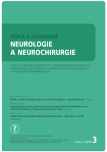Efgartigimod alfa – the importance of FcRn blockade in the treatment of generalized myasthenia gravis
Authors:
MUDr. Tomáš Božovský 1; doc. MUDr. Edvard Ehler, CSc. 2
Authors‘ workplace:
Neurologická klinika LF UK a FN Plzeň
1; Neurologická klinika FZS UP a Pardubické krajské nemocnice, a. s.
2
Published in:
Cesk Slov Neurol N 2023; 86(3): 214-217
Category:
Drug Profile
Overview
Inhibitor of neonatal Fc receptors (FcRn), efgartigimod alfa, is indicated as an adjunctive therapy to standard treatment for adult patients with generalized myasthenia gravis and positivity of antibodies against acetylcholine receptors (AChR). IgG antibodies bound to FcRn escape lysosomal degradation and return to circulation. Efgartigimod alfa is a naturally occurring FcRn ligand modified to bind to it with higher affinity. By blocking FcRn, the concentration of autoreactive IgG antibodies in serum decreases, while the treatment does not affect the levels of other immunoglobulins (IgA, IgD, IgE, or IgM) or albumin levels. In the ADAPT clinical trial, 68% of patients treated with efgartigimod alfa achieved the primary endpoint, which was defined as a reduction of at least 2 points in the MG-ADL score one week after the fourth infusion, which was sustained for at least 4 consecutive weeks.
Keywords:
immunomodulation – generalized myasthenia gravis – neonatal Fc receptors – IgG antibodies – efgartigimod alfa
Sources
1. Gilhus NE, Tzartos S, Evoli A et al. Myasthenia gravis. Nat Rev Dis Primers 2019; 5(1): 30. doi: 10.1038/ s41572-019-0079-y.
2. Gilhus NE, Verschuuren JJ. Myasthenia gravis: subgroup classification and therapeutic strategies. Lancet Neurol 2015; 14(10): 1023–1036. doi: 10.1016/ S1474-4422(15)00145-3.
3. Zisimopoulou P, Evangelakou P, Tzartos J et al. A comprehensive analysis of the epidemiology and clinical characteristics of anti-LRP4 in myasthenia gravis. J Autoimmun 2014; 52 : 139–145. doi: 10.1016/ j.jaut. 2013.12.004.
4. Cole RN, Ghazanfari N, Ngo ST et al. Patient autoantibodies deplete postsynaptic muscle-specific kinase leading to disassembly of the ACh receptor scaffold and myasthenia gravis in mice. J Physiol 2010; 588(Pt 17): 3217–3229. doi: 10.1113/ jphysiol.2010.190298.
5. Drachman DB, Adams RN, Josifek LF et al. Functional activities of autoantibodies to acetylcholine receptors and the clinical severity of myasthenia gravis. N Engl J Med 1982; 307(13): 769–775. doi: 10.1056/ NEJM198209233071301.
6. Engel AG, Arahata K. The membrane attack complex of complement at the endplate in myasthenia gravis. Ann N Y Acad Sci 1987; 505 : 326–332. doi: 10.1111/ j.1749-6632.1987.tb51301.x.
7. Skeie GO, Apostolski S, Evoli A et al. Guidelines for treatment of autoimmune neuromuscular transmission disorders. Eur J Neurol 2010; 17(7): 893–902. doi: 10.1111/ j.1468-1331.2010.03019.x.
10. Howard JF Jr, Bril V, Burns TM et al. Randomized phase 2 study of FcRn antagonist efgartigimod in generalized myasthenia gravis. Neurology 2019; 92(23): e2661–e2673. doi: 10.1212/ WNL.0000000000007600.
11. Kuo TT, Baker K, Yoshida M et al. Neonatal Fc receptor: from immunity to therapeutics. J Clin Immunol 2010; 30(6): 777–789. doi: 10.1007/ s10875-010-9468-4.
12. Souhrn údajů o přípravku Vygvart. [online]. Dostupné z: https:/ / www.ema.europa.eu/ en/ documents/ product-information/ vyvgart-epar-product-information_cs.pdf.
13. Vaccaro C, Zhou J, Ober RJ et al. Engineering the Fc region of immunoglobulin G to modulate in vivo antibody levels. Nat Biotech 2005; 23(10): 1283–1288. doi: 10.1038/ nbt1143.
14. Ulrichts P, Guglietta A, Dreier T et al. Neonatal Fc receptor antagonist efgartigimod safely and sustainably reduces IgGs in humans. J Clin Invest 2018; 128(10): 4372–4386. doi: 10.1172/ JCI97911.
15. Gable KL, Guptill JT. Antagonism of the neonatal Fc receptor as an emerging treatment for myasthenia gravis. Front Immunol 2020; 10 : 3052. doi: 10.3389/ fimmu.2019.03052.
16. Nelke C, Spatola M, Schroeter CB et al. Neonatal Fc receptor-targeted therapies in neurology. Neurotherapeutics 2022; 19(3): 729–740. doi: 10.1007/ s13311-021-01175-7.
17. Howard JF, Bril V, Vu T et al. Safety, efficacy, and tolerability of efgartigimod in patients with generalised myasthenia gravis (ADAPT): a multicentre, randomised, placebo-controlled, phase 3 trial. Lancet Neurol 2021; 20(7): 526–536. doi: 10.1016/ S1474-4422(21)00159-9.
Labels
Paediatric neurology Neurosurgery NeurologyArticle was published in
Czech and Slovak Neurology and Neurosurgery

2023 Issue 3
- Memantine Eases Daily Life for Patients and Caregivers
- Possibilities of Using Metamizole in the Treatment of Acute Primary Headaches
- Memantine in Dementia Therapy – Current Findings and Possible Future Applications
- Advances in the Treatment of Myasthenia Gravis on the Horizon
-
All articles in this issue
- Benefits and pitfalls of carotid stents with dual-layer design - a systematic review
- Pituitární adenylátcyklázu aktivující polypeptid (PACAP) a jeho role v patofyziologii migrény
- Verification of the psychometric properties of the Slovak version of the Dementia Rating Scale-2 in a healthy population and in patients with Parkinson‘s disease – a pilot study
- Analysis of a patient group with head and facial injuries in scooter accidents treated at the Central Military Hospital in Prague from 2010 to 2022
- Artificial intelligence in medical writing – a good servant, but a bad master
- LGI1 encephalitis in childhood
- Total locked-in syndrome in a severe course of acute polyradiculoneuritis
- Efgartigimod alfa – the importance of FcRn blockade in the treatment of generalized myasthenia gravis
- Několik rad navrhovatelům grantových projektů v oblasti neurověd a duševního zdraví
- Matejčík V, Haviarová Z, Kuruc R. Peculiarities of the Autonomic Nervous System. Newcastle Upon Tyne: Cambridge Scholars Publishing 2023. ISBN 1-5275-9309-6, ISBN13: 978-1-5275-9309-1, cena 77.99₤.
- Týblová M. Současné a budoucí terapeutické možnosti léčby generalizované formy myasthenia gravis.
- Effect of acupuncture in combination with sinusoidal medium frequency electrotherapy on upper limb motor function of stroke patients
- Czech and Slovak Neurology and Neurosurgery
- Journal archive
- Current issue
- About the journal
Most read in this issue
- Verification of the psychometric properties of the Slovak version of the Dementia Rating Scale-2 in a healthy population and in patients with Parkinson‘s disease – a pilot study
- Total locked-in syndrome in a severe course of acute polyradiculoneuritis
- Analysis of a patient group with head and facial injuries in scooter accidents treated at the Central Military Hospital in Prague from 2010 to 2022
- Benefits and pitfalls of carotid stents with dual-layer design - a systematic review
